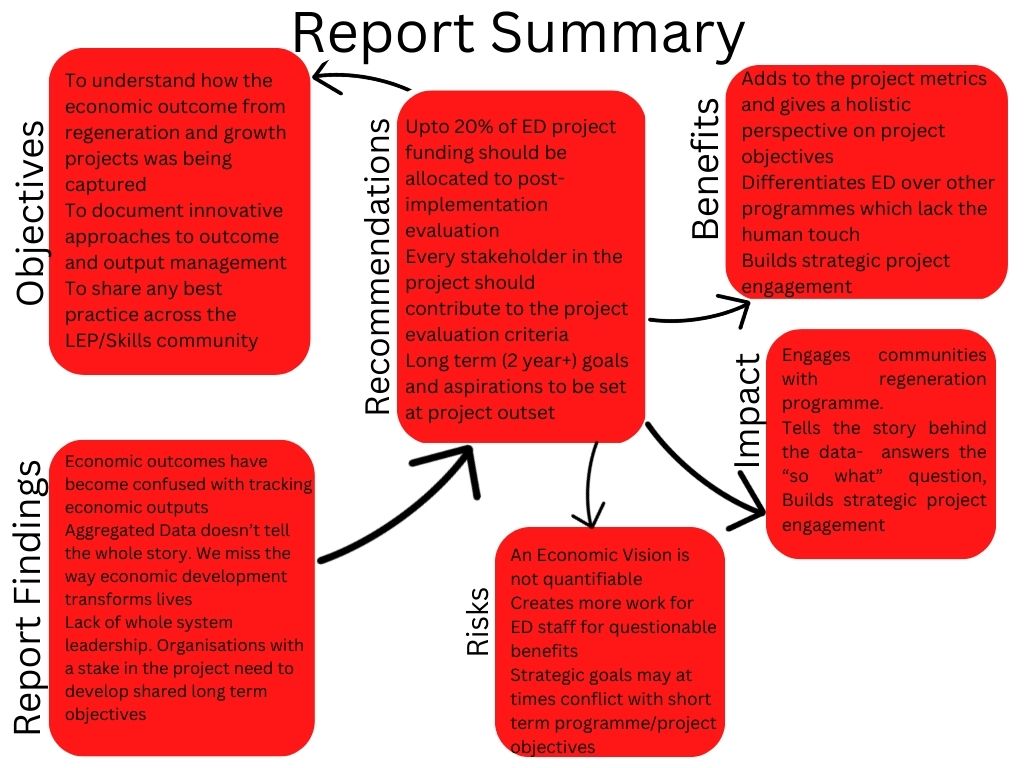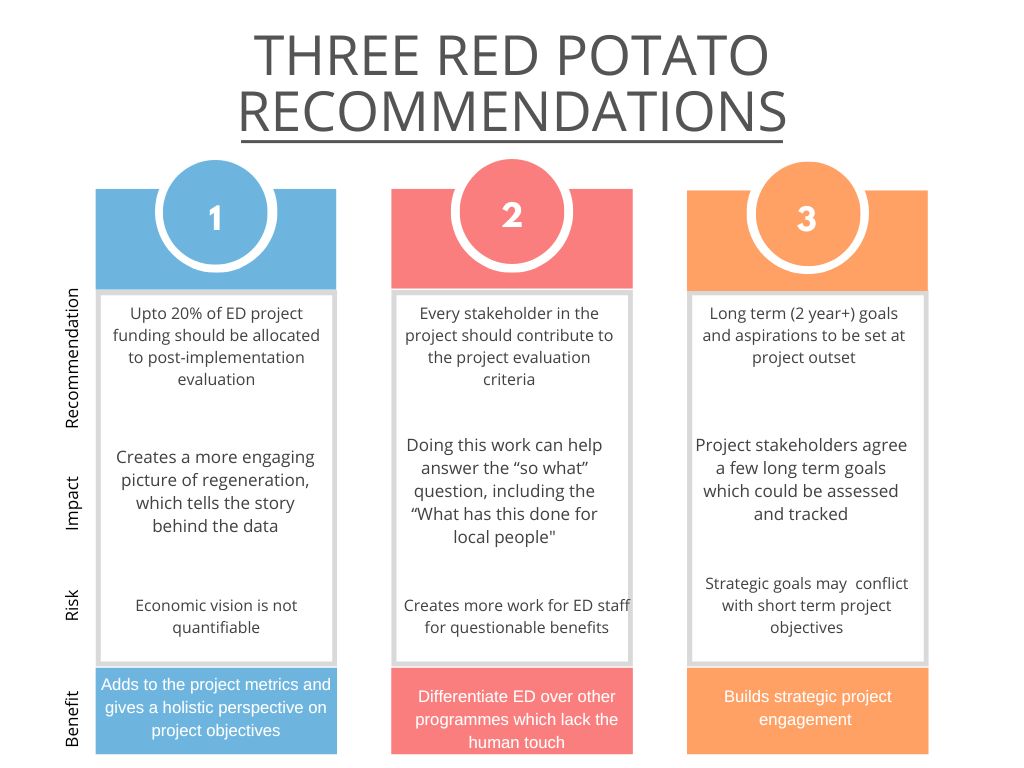Pursuing dreams: Three recommendations for better local economic outcomes
Pursuing dreams: Three recommendations for better local economic outcomes
Executive Summary
This report shows why a radically different perspective is needed to economic development (ED).
A new holistic perspective is required.
Economic development is more than measuring how much extra business floor space has been created. It is also about how lives are changed. Lives are not just about jobs and training places. ED is about wellbeing; do people feel their lives have improved? Are they better served than prior to the project? Also ED should be about being honest about what has not gone right. What outcomes were not achieved.
This is what we mean when we say a new holistic perspective is required.
This report makes three specific recommendations to help achieve this new perspective:
-
- Recommendation 1 – Upto 20% of ED project funding should be allocated to post-implementation evaluation.
Too often ED projects have been blighted by “fire and forget” leadership. By this we mean ED projects need to be followed through and assessed after the project has been completed. This will not happen unless monies are allocated at outset for this purpose. - Recommendation 2 – Every stakeholder in the project should contribute to the project evaluation criteria.
ED projects are usually evaluated based upon criteria set by the funding organisation. When other organisations get a say in evaluation criteria, it is often secondary to the main objectives. But what if all stakeholders had a say in retelling the story of the project? This creates a more holistic perspective. It also means that under-represented groups and those with less economic power can influence and have a stake in how project success is judged. - Recommendation 3 – Stakeholders must set a qualitative vision at project inception.
Economic development projects are often monitored by funders and delivery partners on the basis of monthly and quarterly outputs. This is because economic development projects and programmes are mostly funded on a financial year basis. Setting a qualitative vision adds to the project metrics and gives a holistic perspective on project objectives.
- Recommendation 1 – Upto 20% of ED project funding should be allocated to post-implementation evaluation.
Pursuit and implementation of these recommendations are not dreams. But these recommendations are essential for economic development to have impact.
Purpose of the research project
The purpose of this report is to document the findings following a series of interviews with Skills Hub leaders during 2022.
The interviews discussed the ways in which economic impact is captured. To answer the question “so what”. What difference did a particular intervention make? How do you go about assessing whether the intervention worked? We wanted to get beyond the initial “happy sheet” where participants at events stated whether or not they enjoyed the event. The “happy sheet” is fine for instant evaluation. But what if we want to look at assessing long term change and if improvements need to be made? For instance, whether interventions lead to long term job creation, what was the take-up of training places, how much additional investment and more widely the contribution a particular intervention has made to the local economy.
The focus for this report is important as the UK faces a cost of living crisis. As such the demands on public authorities are high and there is pressure of quick results. Our recommendation is that leadership in ED is not about quick results but is about making changes that are sustained.
As an independent organisation, Red Potato does not have a vested interest. We are not interested in promoting the views of one organisation over another. We recognise that done properly ED is a collaboration between many stakeholders. ED is about the sum of the parts, not the individual interventions of particular organisations.
By correctly identifying and quantifying the size of the ED “prize” at the start of the project, we have a benchmark to comeback to during the project and after the project has finished. This isn’t easy. It requires time and patience which are in short supply in most large organisations. Red Potato is an independent organisation that is very clearly focussed on measuring long term impact.Red Potato have been able to help organisations unlock the story of ED and document the legacy of projects where the benefits only become apparent long after the initial interventions.
It is the reason why Red Potato has been chosen to work on capturing outcomes for projects ranging from measuring career aspirations to Post Covid-19 High Street recovery
Context
The interviews took place online during the summer and autumn of 2022. This period followed the end of Covid19 lockdown measures earlier in the year and the wider backdrop of the national cost of living crisis, in which inflation had reached double digit increases. Furthermore the economic effects of Covid19 and Brexit were beginning to show in the UK economic output, supply chain and labour markets.
The “big picture” economics likely filtered into participant perceptions about the amount of money that would be available in future for economic development, regeneration and investment in skills (human capital) and as well as investment in capital intensive projects such as new roads, and buildings. LEPS had also just emerged from far reaching reviews which included the amalgamation of some LEPs and a reconfiguration of some LEPs away from a focus on infrastructure.
Economic development is led by Local Authorities, Local Enterprise Partnerships and sometimes other special purpose entities such as public/private partnerships. These organisations prepare detailed annual business plans which direct how specific resources are deployed. Because economic development is not a statutory service, the funding is not “ring-fenced”. This means the ED and regeneration projects are more likely to be subject to in-year cuts in spend than statutory services.
Statutory services are core business for local authorities. At a more fundamental level, because ED is not “core” business, the evaluation of long term programme and project impact is usually secondary to keeping to the project budget and output monitoring.
While project goals and visions are often quite lofty and ambitious, sometimes these ambitions quickly get narrowed down into measurable criteria required by funders. In so doing we fail to capture the real benefits from ED, including how it can transform peoples lives and neighbourhoods
Objectives
The Red Potato team framed this research project around three objectives.
- To understand how the economic outcome from regeneration and growth projects was being captured
- To document innovative approaches to outcome and output management
- To share any best practice across the LEP/Skills community
Findings
-
To understand how the economic outcome from regeneration and growth projects was being captured
Our finding: Economic outcomes have become confused with tracking economic outputs
There are many examples of individual action by members of staff. Because most funding streams are driven by yearly and in some cases quarterly cycles, there is a tendency to focus on quarterly metrics. Our research shows current best practice involved aggregating economic development or skills metrics to build a twelve month picture that measures outcomes from economic development and regeneration.
-
To document innovative approaches to outcome and output management
Our finding: Aggregated Data doesn’t tell the whole story. By focusing on economic output data, we miss the way economic development transforms lives
Respondants expressed some frustration that there is not room for nuance when reporting on important projects that have had in some cases life changing impact.
Example: Apprenticeship project targetted at BAME communities. The project attracted significantly more women than men. Because the data was aggregated with other projects under the same funding stream, no analysis was carried out on why women were more likely to participate in the project and/or whether the project was unattractive to men. Capturing some anecdotal evidence from participants could have helped illuminate the factors behind the participant decisions.
-
To share any best practice across the LEP/Skills community
Our finding: There is a lack of whole system leadership. Organisations with a stake in the project need to develop shared long term objectives
Respondents spoke about the limitations of individual projects where project objectives are linked to funding. The funding objectives are usually related to very specific short term (12 month or more often quarterly metrics).
Example: One interviewee described a particular project where there were a range of economic development metrics ranging from jobs created to additional business floor space released. The metrics were specified as a funding condition. The interviewee would complete a monthly spreadsheet for the funder. The spreadsheet data was then used in monthly reviews between the funder and interviewee. The funder was primarily concerned with risk and payment milestones. Once the project was completed the metrics were not used further.
Pursuing the dream of economic development with impact: Report Schema
Recommendations
Summary and next steps
Thanks to all the participants for sharing their insights and taking the time to comment on this important subject. It has been fascinating to hear how different organisations go about measuring outcomes. There is also still room for considerable improvement. Many organisations struggle to demonstrate long term impact – more often than not because they are forced into short term actions, such as yearly funding pressures, changing priorities and different stakeholders.
To discuss how to have sustainable impact from economic development do get in touch with Jay Wheeler, author of this report and Director of Red Potato.
Confidentiality
All interviews were carried out under the proviso that no individual organisation or employees would be directly identified. By preserving anonymity we are confident that the views expressed by interviewees are their own personal opinions and are not necessarily the views of their employers

